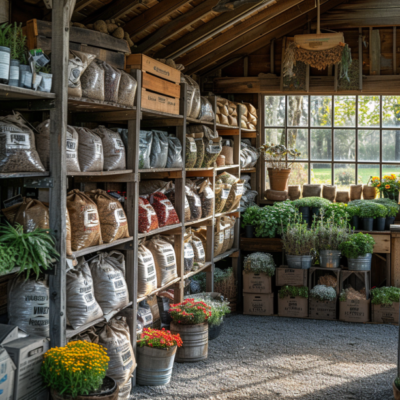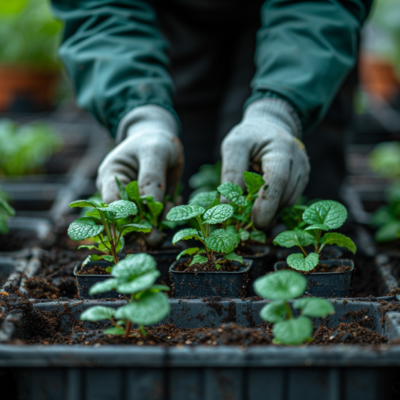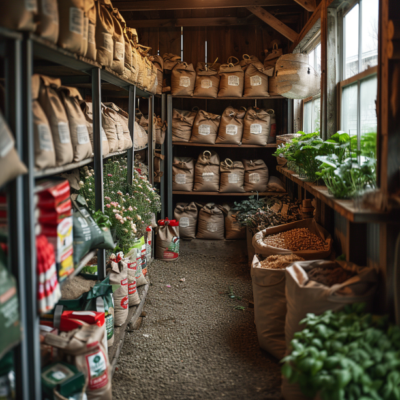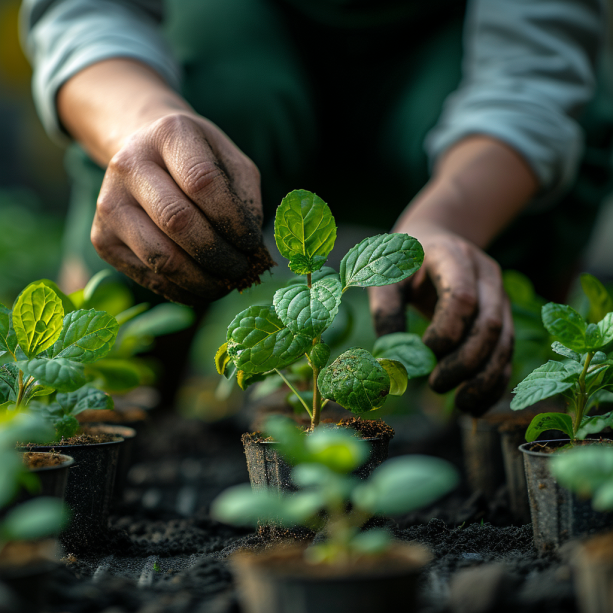According to expert Emma, “Yes, organic fertilizers can expire and stop working over time.”
I found an old bag of fish fertilizer in my shed.
I wondered – does natural fertilizer go bad?
My plants needed food!
Before using the old bag, I had to learn if aged organic fertilizer still helps plants grow.
It turns out natural formulas do expire eventually.
But it depends how they’re made.
I wanted to know all the facts, like storage and packaging.
The science was so interesting!
Keep reading to learn if organic fertilizers expire, and how to make it last for your garden!
KEY TAKEAWAY
Does organic fertilizer expire?
Organic fertilizer does have a shelf life, typically lasting one to five years or more. (1)
Proper storage and adherence to expiration dates are crucial to maintain its effectiveness.
How Long Does Organic Fertilizer Last?
While fertilizers can help your plants and grass grow big and strong, did you ever wonder how long fertilizer actually lasts before it goes bad?
Let’s learn about the shelf life of different organic fertilizers so you don’t waste your money!
We’ll also look at the signs that tell you it’s time to toss out the old fertilizer and buy a fresh batch.
Shelf life of different organic fertilizers
Organic fertilizers like compost and manure usually last at least 6-12 months before going bad.
But the actual shelf life depends on the TYPE of fertilizer and how you store it.
Some shelf lives:
- Liquid organic fertilizers like seaweed solution last 6-12 months unopened, but only 3 months once opened. These tend to go bad quicker than others.
- Dry granular fertilizers like corn gluten meal can stick around for over a year unopened, and 6 months opened. The granules help them last longer.
- Granular organic fertilizers like bone meal and blood meal generally last 12-18 months unopened, and 6-12 months opened. As long as they stay dry, these tend to have some of the longest shelf lives.
- Natural lawn fertilizers like compost and manure usually last at least 6-12 months, so long as you STORE them properly (more on storage tips below).
Factors affecting shelf life

Several things can cause your organic fertilizer to expire sooner, like DIRECT SUNLIGHT, HEAT, MOISTURE, and IMPROPER STORAGE. (2)
Let’s look at three key factors:
- Moisture – Excess moisture from rain or humid conditions allows microbes and mold to grow, breaking down nutrients faster. This applies to liquid AND granular fertilizers.
- Heat – High temperatures speed up the breakdown process. Most fertilizers should be stored at or below 80°F. Storing in a hot garage or shed shortens the shelf life.
- Light – DIRECT SUNLIGHT contains UV rays that can damage nutrients over time, leading to reduced effectiveness. Always store fertilizers in a cool, dry, and dark place.
Signs an organic fertilizer has expired
So how can you tell when your stash of organic fertilizer has officially gone bad?
Here are some signs it’s time for a replacement:
- Liquid organic fertilizers become dark in color and have an unpleasant odor.
- Granular fertilizers clump together instead of remaining loose like they should.
- Compost and manure turn dry and powdery instead of remaining moist and crumbly.
- The fertilizer no longer dissolves well in water as the nutrients have broken down.
- Using an expired fertilizer provides little or no noticable benefit to your plants. You’ll see disappointing results.
So in summary – choose the right TYPE of fertilizer, store it properly in a DRY, COOL place away from DIRECT SUNLIGHT, and watch out for these signs of expiration.
With the right care, organic fertilizers can certainly last over 6 months and sometimes up to 18 months – helping your garden grow big and strong for a long time to come!
What is Organic Fertilizer?
Have you ever wondered what makes a fertilizer “organic” and how it differs from conventional types?
This section will give you an understanding of organic plant foods and their EARTH-FRIENDLY benefits.
Definition of organic fertilizer
Organic fertilizers are made from NATURAL materials like compost, manure, bone meal, and plant or FOOD byproducts.
These contain NUTRIENTS like nitrogen (N), phosphorus (P), and potassium (K) that PLANTS need to grow big and strong.
In contrast, SYNTHETIC fertilizers are chemically formulated from mined minerals and petroleum derivatives.
While effective, they lack the MICROBIAL INOCULANTS and OTHER BENEFITS that organic fertilizers offer soil and environment.
Main types of organic fertilizers

The main categories include:
- COMPOST – Decomposed plant and food SCRAPS. A wonderful soil AMENDMENT.
- MANURE – From animals like cows, chickens, horses etc. Rich in NUTRIENTS.
- SEAWEED or FISH EMULSIONS – High in natural GROWTH HORMONES from sea.
- BONE MEAL – Ground animal bones, high in phosphorus.
- BLOOD MEAL – Dried blood cells, high in nitrogen.
Benefits of using organic fertilizers
Organic types nourish soil with a BALANCED release of nutrients. They:
- Improve soil STRUCTURE and WATER retention.
- Don’t pollute GROUNDWATER like some synthetics.
- Support POLLINATOR-FRIENDLY ecosystems.
- Contain LIVE microbes boosting plant immunity.
- Breakdown OVER TIME vs. synthetics’ quick dumping of nutrients.
In summary, organic plant foods are EARTH-SAFE and support overall garden HEALTH and productivity when used as directed.
Tips for Storing Organic Fertilizer
Now that we know what organic fertilizers are, here are some tips for STORING them properly:
Proper STORAGE protects nutrients from LEACHING or BREAKING DOWN too quickly.
It’s best to keep fertilizers in the ORIGINAL PACKAGING and store them in a:
- COOL, DRY place like a GARAGE or SHED, away from DIRECT SUNLIGHT.
- For LIQUID ORGANIC FERTILIZERS like seaweed solutions, store between 40-80 degrees FAHRENHEIT to avoid freezing or OVERHEATING.
- DRY GRANULAR types do best stored in a DRY area below 100°F.
- Clearly LABEL containers with TYPE and EXPIRATION DATE to avoid confusion later on.
By following these tips, your organic fertilizers will retain MAXIMUM NUTRIENT value until you’re ready to use them, letting your plants, VEGGIES and flowers thrive all season long!
Using Expired Organic Fertilizer

While organic fertilizers are EARTH-FRIENDLY, using ones that have gone BAD could hurt plants or the environment.
Let’s look at the effects, safety tips, and SAFE ALTERNATIVES to avoid disappointment or risk.
Effects of using expired organic fertilizer
Fertilizers normally provide NUTRIENTS plants need to thrive. But ones that have expired may:
- NOT release NUTRIENTS effectively due to BREAKDOWN. Plants won’t benefit.
- Contain HIGH LEVELS OF SALT from minerals not absorbed by plants. This can BURN delicate seedlings or FLOW INTO groundwater.
- Foster TOXIC mold growth if moisture was improperly stored. Breathing mold SPORES can trigger asthma flare-ups.
- Possibly attract CHILDREN OR PETS due to changes in smell or texture, risking accidental INGESTION if not handled carefully.
Safety tips for handling expired fertilizer
If you have expired fertilizer, take these PRECAUTIONS:
- AVOID direct skin contact and wash hands thoroughly after. Wear gloves if possible.
- NEVER consume expired fertilizers or allow children/pets access to stored areas.
- Clean up any spills immediately and dispose of properly to prevent groundwater contamination.
Alternatives to dispose of or repurpose expired fertilizer
Rather than use expired fertilizer, try these EARTH-FRIENDLY options instead:
- COMPOST IT by layering in yard waste for natural DECOMPOSITION.
- ADD to GARBAGE for landfilling to prevent improper dumping that may pollute local streams.
- Check if your community accepts at local HAZARDOUS WASTE drop-off locations.
- USE in areas where excess nutrients won’t harm like non-edible ornamental plants or trees.
Being mindful of STORAGE best practices and EXPIRATION DATES helps avoid risk while still nurturing healthy, thriving gardens naturally!
Additional Tips
Some ways to minimize waste and MAXIMIZE the POTENCY of your organic fertilizers include:
- USE up slightly expired fertilizer by top-dressing potted plants or mixing into border soils in Fall for Winter decomposition.
- PURCHASE smaller quantities more often to reduce amount sitting unused on shelf past prime.
- KEEP fertilizer DRY and out of DIRECT SUN to slow BREAKDOWN during storage at home.
- CHECK fertilizers periodically for signs they have GONE BAD like changed smell, texture or failure to dissolve in water as expected. Replace as needed.
With care, STRATEGIC usage and replenishment when NEEDED, organic plant foods can fuel garden success for years to come!
Frequently Asked Questions
How long can I store fertilizer?
Many dry fertilizers like granular fertilizer and dry fertilizers can last for years if stored properly.cool dry areas like a garage are best.
Liquid fertilizers like liquid organic and synthetic liquid usually have a shorter shelf life of 1-2 years.
What are some signs fertilizer has gone bad?
If fertilizer smells bad or looks clumpy/caked, it may have lost their potency.
Old fertilizer won’t damage plants directly but won’t provide the nutrients like a fresh bag.
Another sign is if it doesn’t dissolve well in water like a water soluble plant food should.
Do different types of fertilizer expire at different rates?
Yes,types of fertilizers expire at different rates based on their formulation and how they are stored.
Slow release granular fertilizers like organic granular can last 3-5 years while…
…liquid organic fertilizer,synthetic liquid, and weed and feed products typically…
… last 1-2 years. Granular fertilizers generally have alonger shelf life than liquid forms.
How does humidity and temperature affect fertilizer?
High humidity and fluctuating temperatures can cause fertilizers to break down faster.
It’s best to store fertilizers in acool dry area with consistent temperatures between 40 to 80 degrees Fahrenheit.
Avoid leaving fertilizers outside where they will be exposed to heat, moisture and freezing conditions.
Is it ok if my fertilizer looks different?
Fertilizers can sometimes change in appearance over time due tostorage conditionsbut that doesn’t always mean it’s no good.
As long as it still dissolves uniformly and doesn’t smell bad, it’s generally fine to use.
Always check the expiration date or best by date on packaging for assurance.
When in doubt, it’s best to replace old fertilizer.
How do I safely store my fertilizer?
To get the longest life, store your fertilizer in its original packaging in a cool, dry place away from children and pets.
Be sure containers are tightly sealed.It’s best to store fertilizers off the ground on shelving or an elevated surface to avoid moisture issues.
Don’t store fertilizers near heat sources or in direct sunlight which can cause them to break down faster.
Proper storage can make fertilizer last several seasons!
Conclusion
After exploring if organic fertilizers expire, I’ve learned:
- All organic formulas have a shelf life. Their age depends on the source.
- Nitrogen-based tend to expire faster than phosphorus or potash.
- Dry, pelleted fertilizers last longer than liquid versions.
- Proper storage in a cool, dry place extends shelf life.
- Packaging affects exposure to air, moisture, and microbes.
- Expired organic fertilizer won’t harm plants, but loses potency.
- Compost and manures may contain weed seeds or pathogens if too old.
While organic fertilizers eventually degrade, knowing their production method and storing them properly allows us to stretch their usefulness.
Always check the smell and appearance before applying aged organic formulas.
And let me know if you have any other tricks for making organic fertilizers last!
References
- https://www.ageold.com/is-your-fertilizer-still-good/#:~:text=In%20a%20retail%20setting%2C%20where,five%20years%20or%20sometimes%20longer.
- https://mintech.com/how-to-improve-fertilizer-shelf-life/
Related Articles
- https://allthingsgardener.com/how-to-make-organic-urea-fertilizer/
- https://allthingsgardener.com/the-best-fertilizer-for-vegetable-garden/
- https://allthingsgardener.com/reuse-bad-potting-soil-in-a-bag/


